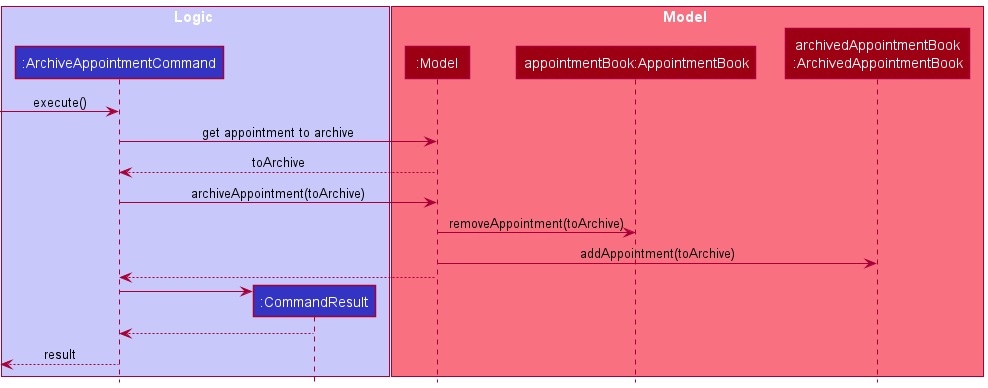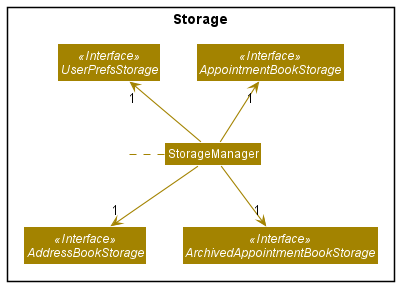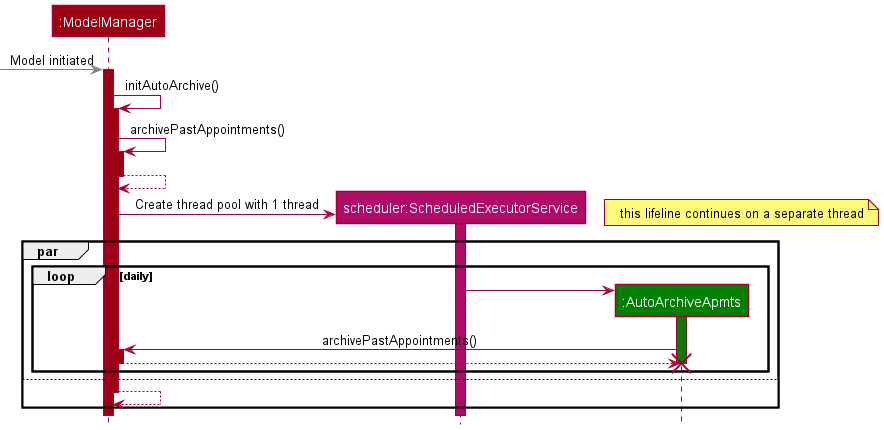Joshen's Project Portfolio Page
Project: Doc’it
Doc’it provides a centralised platform for authorised staff from small family clinics to view, update, and onboard patient records, solving the inefficient paper records and files used today. With Doc’it, small family clinics can reduce man-hours in managing paper files, translating this ‘saved’ time into better frontline care services Doc’IT is a desktop address book application. The user interacts with it using a CLI, and it has a GUI created with JavaFX. It is written in Java, and has about 10 kLoC.
Summary of Contributions
Given below are my contributions to the project:
- New Feature: Added
ArchivedAppointmentBookclass to store details of archived appointments- What it does: stores details of archived appointments, but prevents internal modification of data.
- Justification: This feature allows the user to archive and view archived appointments, to look at previous patient prescriptions and past appointments.
- Highlights: The implementation requires careful restriction of access for the new classes to prevent misuse and inappropriate modification of archived data.
- Credits: Implementation details of
AppointmentBookby teammate Gabriel Goh - Relevant PR: #69
- New Feature: Integrate
AppointmentandPrescriptionsinto the GUI- What it does: display appointment information on the GUI.
- Justification: This feature extends the functionality of the CLI application as a user can immediately view upcoming appointments at a glance.
- Highlights: A “TODAY” tag is displayed on appointment cards with appointments scheduled today. Integration of appointments on the GUI was challenging as many considerations had to be made with regards to how appointments should be handled when patients were removed from the system.
- Relevant PRs: #152, #91
- New Feature: Auto-Archive feature
- What it does: auto-archives expired (24-hour past) appointments.
- Justification: This feature improves the archiving process significantly because this saves the user trouble of archiving many (e.g. >20) past appointments when they are already over.
- Highlights: This feature uses a thread pool to schedule the archive command at a specific timing each day. It was challenging to implement testcases due to the time-sensitive nature of the feature.
- Credits: Implementation adapted from https://stackoverflow.com/a/20388073
- Relevant PR: #155
- New Feature: Sort Appointments feature
- What it does: sorts appointments in order of whether its today, followed by dateTime, and patient name.
- Justification: This feature allows the user to view the most urgent appointments first, and assign prescriptions to the most important appointments (those happening today).
- Highlights: This feature required use of the Comparable interface for the
PatientandAppointmentclasses, and checks with the current system time to verify if an appointment is deemed ‘expired’. - Relevant PR: #155
-
Code contributed: RepoSense link
- Project management:
- Managed releases
v1.1-v1.4(4 releases) on Github
- Managed releases
- Enhancements to existing features:
- Completely revamped the GUI with modern UI trends #121
- Wrote additional tests for existing features
- Handled most of the UI changes, UI testing, and UI debugging
- Documentation:
- Community:
- Debugging:
Contributions to the User Guide:
List all archived appointments: apmt alist
Shows the list of all archived appointments.
Format: apmt alist
Examples:
apmt alistLists all archived appointments.
Expected Outcome:
[UI CARDS]
1. Patient Name: Bernice Yu | Appointment Date: 2021-1-05
2. Patient Name: Alex Yeoh | Appointment Date: 2021-1-06
3. Patient Name: Charlotte Oliveiro | Appointment Date: 2021-1-23
Listed all archived appointments
Archive an appointment: apmt archive
Archives an old appointment that is already past its date.
Format: apmt archive INDEX
- Archives the appointment at the specified INDEX.
- The index refers to the index number shown in the displayed appointment list.
- The index must be a positive integer 1, 2, 3, …
Examples:
apmt archive 1Archives appointment at index 1.
Expected Outcome:
Archived Appointment:
Patient: Alex Yeoh; Datetime: 31 Dec 2012 1200; Prescription: []
Sort all appointments: apmt sort
Shows a sorted list of all appointments
Format: apmt sort
Examples:
apmt sortLists all appointments.
Expected Outcome:
[UI CARDS]
1. Patient Name: Bernice Yu | Appointment Date: 2021-06-05
2. Patient Name: Charlotte Oliveiro | Appointment Date: 2021-07-21
3. Patient Name: Alex Yeoh | Appointment Date: 2021-10-05
4. Patient Name: David Li | Appointment Date: 2021-10-06
Sorted Appointments based on default settings.
Contributions to the Developer Guide:
Archiving an Appointment
Overview
A user is able to archive an appointment when the appointment is expired, i.e. the patient has either missed his/her appointment or already attended the scheduled appointment. In this case, the appointment should be archived, so that clinic staff are able to view what medicine was prescribed to the patient during previous appointments.
Implementation Details

Users may archive specific appointments manually to remove visual clutter. This is done through the ArchiveAppointmentCommand.
The above sequence diagram displays how the archive command works. The parsing mechanism has been abstracted out from the above diagram as it has been covered in previous diagrams. An example input can be viewed in our User guide. It first retrieves the Appointment to archive from the appointment index parsed through the user input, removes the appointment from upcoming appointments, and adds it to archived appointments.
Archiving is facilitated by the ArchivedAppointmentBook. As opposed to the regular AppointmentBook, it does not allow
users to directly modify the data of appointments as archived data should not be edited. Hence, the following operations
have the private access modifier:
ArchivedAppointmentBook#setAppointment(Appointment target, Appointment editedAppointment)- edits thetargetAppointment to be replaced witheditedAppointment.ArchivedAppointmentBook#removeAppointment(Appointment key)- removes the target Appointmentkey.
The reason these methods exist in the class is so to support the methods ArchivedAppointmentBook#updatePatient(Patient target, Patient editedPatient)
and ArchivedAppointmentBook#removePatient(Patient target), which are called to accurately reflect any updates/removals of patient
details.

In the Storage component, the addition of ArchivedAppointmentBook also necessitates the implementation of a separate storage system
for archived appointments. This forms under ArchivedAppointmentBookStorage, alongside AddressBookStorage and AppointmentBookStorage.
The .json file for archived appointments is named ‘archivedappointmentbook.json’.
Design Considerations
| Alternative Considered | Current implementation | Rationale for current implementation |
|---|---|---|
Implementing archived appointments as a second UniqueAppointmentList attribute under the AppointmentBook class |
Have a separate class ArchivedAppointmentBook |
Having a separate class ArchivedAppointmentBook separates the two types of appointments better to facilitate data management. It ties in better with our Storage framework, and archivedappointmentbook.json files can be easily used by the user, instead of having to split one appointmentbook.json files into two segments. |
Auto-Archiving Feature
The archiving implementation involves scanning through all appointments in a day and comparing it to
the current date and time of the user system. If the current date and time is 24 hours ahead of the scheduled
appointment time (24-hour buffer), i.e. by our definition, expired, the appointment is automatically archived. This auto-archiving implementation is handled
by the ModelManager class in two ways.

-
Upon initialisation of the application, the application automatically archives expired appointments (24-hours past their scheduled time). This is called through
ModelManager#archivePastAppointments(). -
A
ScheduledExecutorServiceobject schedules the taskAutoArchiveApmtswhich implements theRunnableinterface. Every day at theModelManager.UPDATE_HOURth hour, theRunnableobject executes theModelManager#archivePastAppointments()method.
In the case where there are many scheduled appointments, this saves the user trouble of archiving past appointments when they are already over.